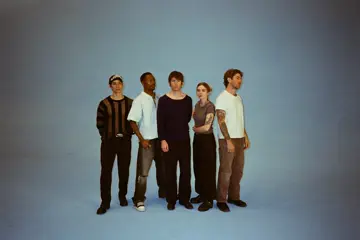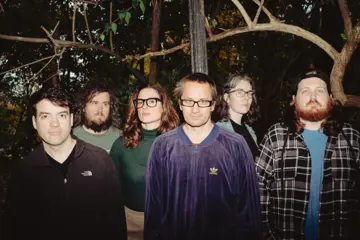 Greta Gerwig
Greta Gerwig"I'm always interested in stories about women that don't include romance, because I think that they're so incredibly rare,” says Greta Gerwig. “And that's not true of men. There are plenty of movies about men that have nothing to do with romance, and I think it's important for women to have stories that have nothing to do with falling in love, or falling out of love, or being in a relationship or desperately wanting to be in a relationship.”
The 30-year-old actress is talking about Frances Ha, the film that she co-wrote with boyfriend/director Noah Baumbach, in which she stars as the titular character; a 20-something dame caught in post-collegiate malaise of career dissatisfaction and living-situation confusion. In most set-ups that would mean, really, she's lacking a man, and waiting around to find one. Gladly, Gerwig and Baumbach dodge that tendency, giving us a flawed heroine, one of the most well-rounded and singular creations to arrive on screen in aeons.
“We didn't start off with a thesis statement. Like: we want to make a film about a woman and her best friend, and ambition and failure,” says Gerwig. “It was only at some point in the writing when we realised there was no traditional heterosexual romance being told in this movie. And once we realised that, we were really excited! I was particularly excited by that, and almost protective of that idea from that point on; and so we went about making it very deliberately the case. The opening scene of the movie, where she's having the discussion with her boyfriend about the cats and then they break up, that's almost this moment of dismissal of that narrative. Like, it's almost a misdirect – you think maybe we're going to follow that relationship, but instead we pick up on this other non-romantic relationship.”
Gerwig's on-screen best friend is played, winningly, by Mickey Sumner, and Girls beefcake Adam Driver and Michael Zegen play platonic pals of the heroine. For indie-rock-spotters, there's even an appearance by Britta Phillips and Dean Wareham; the latter having been Baumbach's recurring collaborateur since 1997's Mr. Jealousy.
Don't miss a beat with our FREE daily newsletter
Gerwig and Baumbach initially worked together on 2010's Greenberg, which marked the first 'major movie' role for Gerwig. Before that, she was mumblecore's 'it' girl: starring in three films with Joe Swanberg: LOL, Hannah Takes The Stairs and Nights And Weekends (the latter of which she co-wrote and co-directed), and playing key roles in the Duplass Brother's Baghead and Ti West's retro-horror movie The House Of The Devil. Gerwig's star would continue to ascend, working with Woody Allen on his disastrous To Rome With Love and headlining Whit Stillman's comeback movie Damsels In Distress. Baumbach and Gerwig were going to be working on an adaptation of Jonathan Franzen's novel The Corrections for HBO, but when it got stuck in development hell they made Frances Ha as a low-budget, black-and-white indie movie.
So, after a long-time seeming like a starlet on the verge of a breakout, Frances Ha looks like the real deal for Gerwig, both as writer and as actor. And the success of the film is something she couldn't be more pleased with. “We really made exactly the film we wanted to make, and we never had any considerations towards commercial viability,” Gerwig says. “We made it out of a real purity of heart, and without any cynicism.”
Not that Gerwig is ready to put any stock in the plaudits that've been thrown at her. “I protect my delicate ego by not reading anything written about me, or anything that I've done,” she laughs. “I used to, but I realised very quickly that I could not, because whether it was good or bad it'd just endlessly play on my mind. I am sensitive!”
Gerwig's even bringing her parents along for the ride – in Frances Ha, they play her parents. “We wrote that section where she goes home to visit her parents without thinking it'd be Sacramento, or my parents,” Gerwig offers. “But then, when we were planning her shoot, it felt like we could ask them to do it. We weren't just coming to photograph their lives, we were asking them to participate in this movie we were making. And I think they were terrific!
“I like it when filmmakers do things that intersect with their own lives,” continues Gerwig. “I think when you're presented with a choice of shooting something that means something to you or shooting something that doesn't, you should always [go with the former]. Because you'll be able to see it – to feel it – through the screen. You don't want every character to be played by a non-actor, but when you surround your main actors with 'real people', it gives the film this quality which is otherwise unattainable.”
The presence of her parents conflates with the idea that Gerwig is playing a version of herself; that her Frances Ha screenplay functions as a form of creative therapy. It's an idea she both considers and dismisses. “I'm very different to Frances,” she says. “I think a lot of people assume that it's just me up there, but I had a very different experience in my mid-to-late-20s. It's really an experience I didn't have. I certainly didn't have a lot of money, but I had a lot more encouragement from the world than Frances does, and I never made the choice to give up the dream and take the day job. In some ways, maybe I'm exploring an alternate life that could've happened but didn't. Frances really feels, to me, like an outside-of-my-body comedic creation as a character. I don't feel like her, but I feel like she's a uniquely Greta Gerwig invention. It's like the difference between Buster Keaton the person and Buster Keaton the character. It's a performance, but it's still completely genuine.”














